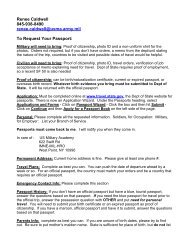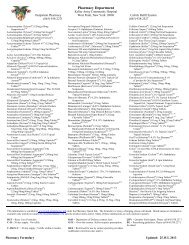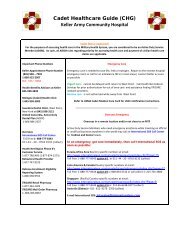North - Keller Army Community Hospital - U.S. Army
North - Keller Army Community Hospital - U.S. Army
North - Keller Army Community Hospital - U.S. Army
Create successful ePaper yourself
Turn your PDF publications into a flip-book with our unique Google optimized e-Paper software.
A: I have responsibility for <strong>Army</strong> medicine and the health care itprovides to our Soldiers, Families and other beneficiaries withinthe region of the United States extending from <strong>North</strong> Carolina toMaine, and from the Atlantic Coast to Wisconsin. I’m also responsiblefor Soldier readiness issues within the region.Q: What are your top priorities in assuming your new role as thecommanding general of the <strong>North</strong>ern Regional Medical Command?Retired Lt. Gen. Eric Schoomaker, former <strong>Army</strong> Surgeon General,passes the <strong>North</strong>ern Regional Medical Command flag to Brig. Gen.Joseph Caravalho Jr., commanding general of the <strong>North</strong>ern RegionalMedical Command, at the change of command ceremony held in theRose Garden on the Walter Reed <strong>Army</strong> Medical Center, July 29, 2011.Photo: Joshua L. Wickassignments as surgeon, 1st Battalion, 1st Special Forces Group(Airborne), Okinawa, Japan; physician augmentee, Joint SpecialOperations Command, Fort Bragg; surgeon, 75th Ranger Regiment,Fort Benning, Ga.; deputy chief of staff, surgeon, U.S. <strong>Army</strong>Special Operations Command, Fort Bragg; and most recently asthe assistant chief of staff, health affairs, XVIII Airborne Corps,Fort Bragg. He also commanded the 28th Combat Support <strong>Hospital</strong>and the 44th Medical Command (Rear) (Provisional), bothat Fort Bragg. He has two deployments in support of OperationIraqi Freedom. As an AMEDD general officer, Caravalho servedin Iraq as the surgeon for both Multi-National Force-Iraq andMulti-National Corps-Iraq. Following his last deployment, heserved as commanding general for both Southern Regional MedicalCommand and Brooke <strong>Army</strong> Medical Center, both at Fort SamHouston, Texas.Caravalho earned the special forces and Ranger tabs and wasawarded the Expert Field Medical Badge. He completed the<strong>Army</strong> Airborne and Flight Surgeon schools, as well as the NavyDive Medical Officer and SCUBA courses. His individual awardsinclude the Distinguished Service Medal, Legion of Merit withoak leaf cluster, Bronze Star Medal, Defense Meritorious ServiceMedal, <strong>Army</strong> Meritorious Service Medal with six oak leaf clusters,Joint and <strong>Army</strong> Commendation Medals, and the <strong>Army</strong> AchievementMedal with three oak leaf clusters. He is a recipient of theOrder of Military Medical Merit. He holds current certification innuclear cardiology.Q: Can you describe your mission and responsibilities at your newposition?A: I want to ensure we promote wellness, prevent disease anddeliver high-quality health care to those who serve our nation.Our relevance to our Soldiers and Families, to the warfighters, tothe Department of Defense and, indeed, to the American public,is contingent on our ability to provide high-value services. Atthe individual level, this means we provide a memorable healthexperience to each patient. To the warfighter, this means we trainour medics and clinicians to the highest standard, while preparingSoldiers well for their deployments. To the Department ofDefense, this means we provide the very best care possible for thelarge population of military beneficiaries. Through it all, we mustbe standardized in our approach, yet compassionate with each humaninteraction.Q: How do you plan on developing leaders “at all levels” to take<strong>Army</strong> medicine forward?A: Within <strong>Army</strong> medicine, we have a valuable workforce that includesofficers, noncommissioned officers, Soldiers, Department ofthe <strong>Army</strong> civilians, contractors and volunteers. The difference wehave over university and community medical institutions is thatwe get to serve those who serve our nation. To ensure <strong>Army</strong> medicinecontinues to progress well into the future, we have to developleaders within our workforce to take us forward. I thoroughlyenjoy this aspect of our job.In my mind, every officer is a future <strong>Army</strong> Surgeon General, everysoldier is a future Command Sergeant Major of the <strong>Army</strong> MedicalCommand, and every <strong>Army</strong> civilian is a future Chief of the <strong>Army</strong>Medical Command’s Civilian Corps. In essence, we are going to alloweach individual to work within the full scope of their trainingand authority. We will introduce processional challenges at everylevel to expand everyone’s knowledge and experiences. Whilemaintaining standardization where appropriate, we will welcomeinnovation limited only by law, ethics and morality. Everyone inthis organization is a leader, and we will give everyone an opportunityto excel for the benefit of the <strong>Army</strong> and the nation it serves.Q: What are the major differences in being in command of theSouthern Regional Medical Command to the <strong>North</strong>ern RegionalMedical Command?A: At the Southern Regional Medical Command, we focused initiallyon the <strong>Army</strong> Medical Command reorganization that broughttogether the Great Plains and Southeastern Regional Medical17





